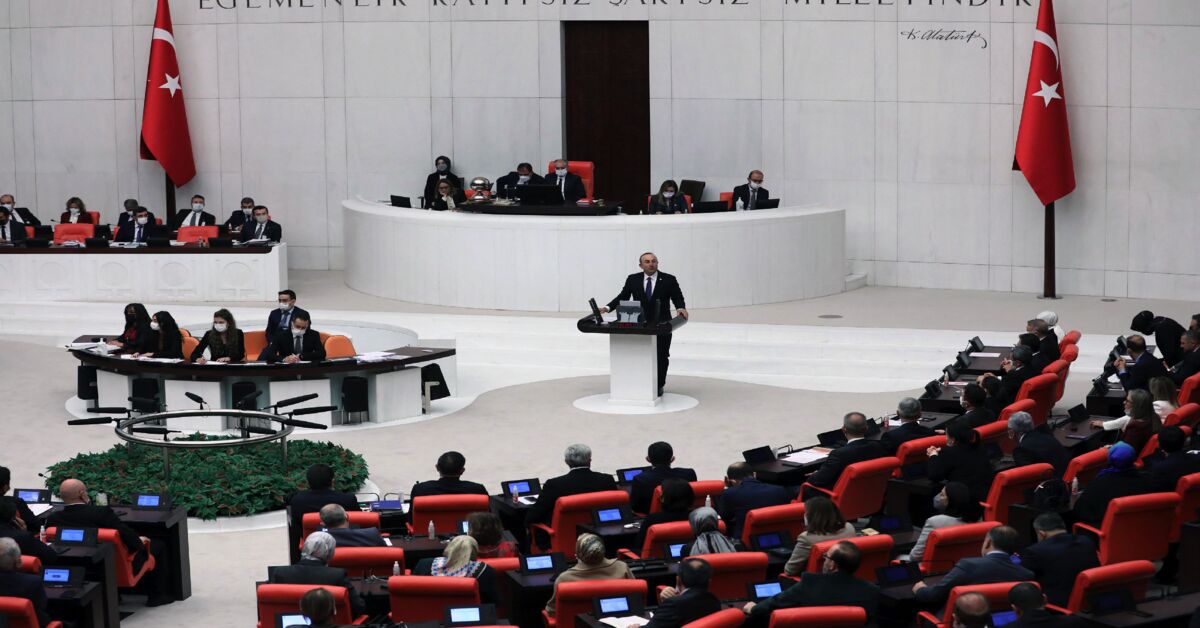Turkish Foreign Minister Mevlut Cavusoglu announced in Turkish parliament at the beginning of the week that Turkey would normalize ties with Armenia and charter flights between Istanbul and Yerevan would resume.
“We will mutually appoint envoys as part of normalization steps with Armenia,” Cavusoglu said, adding that Ankara would coordinate its steps with Azerbaijan.
Citing a senior Turkish official, Bloomberg reported that Turkey’s surprise overture is in line with President Joe Biden’s request, who allegedly urged Erdogan to open the country’s border with landlocked Armenia during the two leaders’ October meeting in Rome.
According to the Bloomberg report, Turkey hopes that normalizing ties with Armenia will help Ankara to improve its strained relations with Washington over the former’s purchase of Russian air missile defense systems. The report has gone as far as to claim, “Erdogan could reap major benefits from any foreign policy move that helps to stabilize the economy as skyrocketing inflation threatens his popularity ahead of the 2023 vote.”
Turkey’s overture has nothing to do with the request of Biden, nor is it aiming to reap major benefits from the foreign policy move in a bid to stabilize its economy amid currency crisis as “skyrocketing inflation threatens” Erdogan’s popularity ahead of the scheduled 2023 elections.
In a bid to mend the strained relations with Washington, Turkey needs to withdraw from the S-400 deal it reached with Moscow. Ankara cannot alleviate Washington’s objections to Turkey’s acquisition of the S-400s by normalizing ties with Armenia.
Moreover, Turkey’s economy is in such a deep crisis that this sort of foreign policy steps cannot prevent the looming train wreck, which in New York Times wording “has sped up with a ferocious intensity.”
The financial crisis and the Turkish currency’s unprecedented depreciation is Erdogan’s making. “And the foot that’s pushing hardest on the accelerator belongs to the country’s authoritarian president, Recep Tayyip Erdogan,” because of his “insistence on lowering interest rates in the face of galloping inflation — precisely the opposite tactic of what economists almost universally prescribe,” The New York Times wrote.
Turkey is in such a desperate situation that new Finance Minister Nureddin Nebati, who was handpicked by Erdogan, reportedly called on the country’s businessmen to exchange $100 million converting to the Turkish lira.
While the devastatingly shaken country is on the verge of financial bankruptcy, normalization with Armenia would not yield any economic benefits for Erdogan to enhance his chances in the 2023 elections.
The text of a trilateral agreement signed between Russia, Armenia and Azerbaijan that ended the Nagorno-Karabakh clashes in November 2020 might provide clues for Turkey’s motivations on the latest move. The agreement, which Ankara also supported, was more than just a cease-fire deal — it was a document that aimed to shape the region’s future.
The last provision of the deal calls for a setup of a corridor connecting mainland Azerbaijan with its autonomous exclave of Nakhichevan along the Turkish border.
Such a corridor would directly link Turkey to Azerbaijan on the Caspian Sea’s western shore and from there to other Turkic states in Central Asia, in line with a decades-old joint Turkish and Azeri aspiration.
Establishment of regional corridors and roads linking regional countries to each other also useful for China’s ambitious Belt and Road Initiative.
Commenting on the geopolitical importance of the trilateral agreement, The Economist said last year, “Though not mentioned in the trilateral agreement signed between the two belligerents and Russia, Turkey is a big beneficiary of it. It is to get access to a transport corridor through Armenian territory … linking Turkey to Central Asia and China’s Belt and Road Initiative. Russia will control the road itself, but Turkish and Chinese goods will travel along with it, and all parties stand to benefit economically.”
Azerbaijan’s President Ilham Aliyev also hailed the multifaceted importance of the transit-corridor plan. He said that the corridor would “unite the Turkic world, as well as Russia with Armenia,” speaking in a Turkic Council summit held in Istanbul in November.
Opening of transport links is also in line with Russia’s aim to increase its geopolitical influence in its former backyard, South Caucasus, as it would have access to Armenia, Turkey and Azerbaijan through railroads, bypassing Georgia.
The shift in the balance of power in the South Caucasus has driven Turkey and Armenia to normalize their decisions. Armenia lost, and Azerbaijan regained all of the territories that had fallen under Armenian occupation in 1993. Turkey had closed off its border with Armenia in 1993 in solidarity with Baku.
As the new status quo has removed Turkey’s reason to keep the borders closed, Erdogan and other Turkish officials sent signals for normalization. During a visit to Baku in December 2020, Erdogan said “we will open our closed doors if positive steps are taken,” referring to Armenia. In response, Armenia’s Prime Minister Nikol Pashinyan expressed his country’s readiness to strengthen ties with Turkey without preconditions. As a goodwill gesture, Armenia opened its airspace to Turkish Airlines flights to Baku.
Pashinyan, who emerged victorious from Armenia’s early elections in June 2021, acts in self-confidence when it comes to normalization with Turkey. In the September-October issue of bimonthly New Eastern Europe the following observation was made: “Pashinyan won early elections in June 2021 despite the fact he was leading the country when Armenia lost the six-week war with Azerbaijan last autumn. With his election victory, Pashinyan falsified the belief that losing Nagorno-Karabakh would mean losing the power. … Pashinyan’s real achievement was to make Armenians forget about the war.”
The turnout in the Armenian elections was the second lowest since the country gained independence in the 1990s. Nevertheless, his party won 53.9% of the votes. Pashinyan, with a strong mandate, was awaiting a move from Turkey and it came. He could also be encouraged by the endorsement of the United States and the European Union in this regard.
Secretary of State Anthony Blinken tweeted that Washington “welcome and strongly support statements” by the Turkish Foreign Minister and the Ministry of Foreign Affairs of Armenia on appointing special envoys to discuss the process of normalization.
A day later, Pashinyan tweeted from Brussels where he attended the European Eastern Partnership Summit on the sidelines of which he and President Aliyev met with French President Emmanuel Macron informally. From Brussels, Pashinyan wrote: “In a trilateral meeting with Charles Michel and Ilham Aliyev, we reaffirmed the agreement to relaunch the railway based on internationally accepted border and customs regulations on reciprocal principle under the sovereignty authority of countries that will receive railway access to Iran and Russia.”
The missing word that he did not mention is Turkey. Yet it will be the natural outcome of the normalization process. First, the Armenian and Turkish special envoys will meet to discuss the opening of the land border. The process will probably be followed with the Turkish flag carrier’s landing on the tarmac of the international airport in the Armenian capital. The following step might be the reinstatement of ambassadors. If all of these are achieved, the railroad link between Armenia and Turkey, linking the latter with Azerbaijan, could be expected.
Yet a smooth move toward the achievement is not guaranteed. The Turkey-Armenia normalization process can be derailed at any moment. The experience in this regard attests to that. Nonetheless, that is a hopeful step in the right direction.
While Turkey is financially collapsing because of Erdogan’s disastrous policies, a positive move on his part in foreign policy may sound paradoxical, but that is the case. A corridor linking Turkey with the Turkic world through Armenia is the new geopolitical reality of our time, and it certainly can outlive Erdogan and his successors.
Source:Al-Monitor
***Show us some LOVE by sharing it!***



